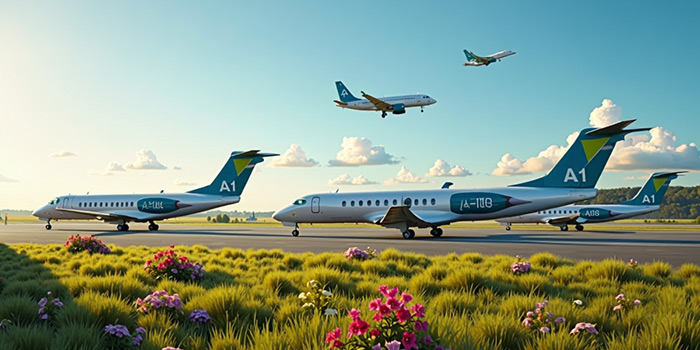Soaring to Success: How Airline Startups Can Navigate the Skies with AviaPro
03 Apr 2025
Highlights:
The aviation industry remains one of the most challenging markets for new entrants, demanding significant financial investment, regulatory compliance, and operational excellence. Yet, a handful of airline startups have managed to defy the odds, carving out market share through innovative business models, strategic expansion, and strong customer engagement. Their success underscores the potential for well-positioned airlines to thrive—provided they have the right support and guidance.

From industry pioneers like Southwest Airlines to fast-growing carriers like Wizz Air and IndiGo, successful startups share common traits: cost discipline, market adaptability, and a strong value proposition. These lessons offer a roadmap for new airline ventures—and with AviaPro’s expertise, emerging carriers can accelerate their growth while mitigating risks in an unpredictable industry.
Learning from the Best: Airline Startups That Redefined Air Travel
Southwest Airlines: The Birth of the Low-Cost Model
Founded in 1967, Southwest Airlines revolutionized air travel in the United States by introducing the low-cost carrier (LCC) model. By adopting a point-to-point network instead of the traditional hub-and-spoke system, Southwest optimized aircraft utilization and improved turnaround times. The airline’s decision to operate a single aircraft type—the Boeing 737—streamlined maintenance and pilot training, further reducing costs. Its culture of customer service and employee engagement helped create a loyal customer base, proving that affordability and reliability could coexist.
Ryanair: Aggressive Cost Control Meets High Growth
Established in 1984, Ryanair took the low-cost model to an extreme, redefining budget travel in Europe. By leveraging secondary airports with lower landing fees, minimizing frills, and maximizing ancillary revenue streams, the airline maintained ultra-low operating costs. Despite criticism of its strict cost-cutting measures, Ryanair successfully tapped into an ever-growing demand for affordable travel across the continent, emerging as one of the most profitable LCCs in the world.
JetBlue Airways: Balancing Affordability with Passenger Comfort
JetBlue, launched in 1998, took a different approach from traditional budget airlines by integrating comfort into its low-cost model. Offering more legroom, free in-flight entertainment, and complimentary snacks, JetBlue successfully differentiated itself from other carriers in the U.S. market. Its innovative pricing and strategic route expansion, particularly in the transcontinental segment, enabled the airline to disrupt the industry while maintaining a strong customer focus.
easyJet: Making Air Travel Accessible to All
Founded in 1995, easyJet was an early adopter of the LCC model in Europe. The airline’s no-frills approach and focus on high-density short-haul routes made air travel accessible to millions who had previously relied on trains and buses. With a clear and disciplined operational strategy, easyJet grew to become one of the most recognized and financially sound low-cost carriers in the region.
Wizz Air: Dominating Central and Eastern Europe
Since its inception in 2003, Wizz Air has capitalized on demand for budget travel in Central and Eastern Europe. The airline strategically targeted an underserved market, using a lean operational model while aggressively expanding its network. Wizz Air’s brand appeal, particularly among younger travelers, and its ability to scale quickly have cemented its dominance in the region.
IndiGo: India’s Most Profitable Airline
IndiGo’s rise since 2006 demonstrates the power of operational efficiency. By focusing on punctuality, reliability, and customer service, IndiGo quickly became India’s largest and most profitable airline. Its commitment to a single aircraft type, cost-effective operations, and a well-executed growth strategy allowed the airline to fill critical gaps in the Indian aviation market while maintaining high profitability.
Key Success Factors for Airline Startups
While each airline took a unique path to success, common themes emerge:
- Cost Discipline: Successful startups maintain tight control over operating expenses, whether by standardizing aircraft, using secondary airports, or optimizing scheduling.
- Market Focus: Identifying and targeting underserved or emerging markets is crucial for differentiation and profitability.
- Innovative Business Models: Whether point-to-point operations, unbundled pricing, or digital sales strategies, innovation plays a key role in airline success.
- Customer-Centric Approach: The most resilient startups balance cost-cutting with passenger experience, building brand loyalty and repeat business.
- Scalability: Airlines that grow strategically, rather than expanding too quickly, are more likely to achieve long-term success.
How AviaPro Supports Emerging Airlines
Navigating the complexities of launching and sustaining an airline requires expertise in operations, technology, and strategic planning. AviaPro Consulting provides emerging carriers with a comprehensive suite of services designed to ensure long-term success.
- Strategic Planning and Market Analysis: Identifying the right market entry points, route networks, and fleet strategy is critical. AviaPro’s aviation consultants leverage deep industry insights to guide airline startups toward profitable decisions.
- Technical and Engineering Support: Aircraft selection, maintenance planning, and regulatory compliance are fundamental to safe and efficient operations. AviaPro’s technical teams provide end-to-end support in these areas, helping airlines optimize their fleets while maintaining the highest safety standards.
- Operational Efficiency and Training: From crew training to digital transformation, AviaPro helps airlines implement cutting-edge solutions that enhance efficiency, reduce costs, and improve the passenger experience.
- Sustainability and Future-Proofing: With increasing pressure on airlines to adopt greener practices, AviaPro assists startups in integrating sustainable technologies and strategies to future-proof their operations.
The path to success for airline startups is paved with challenges, from financial constraints to regulatory hurdles and competitive pressures. However, the stories of Southwest Airlines, Ryanair, JetBlue, easyJet, Wizz Air, and IndiGo illustrate that with the right business model, disciplined cost management, and customer focus, new airlines can not only survive but thrive.
By partnering with AviaPro, emerging airlines gain access to industry-leading expertise that ensures operational excellence, regulatory compliance, and sustainable growth. With the right strategy and support, the next generation of airline startups can navigate the turbulence of the industry and soar to success.
AviaPro Newsroom
+1 416-544-9969
info@aviaproconsulting.com

Editorial Contacts